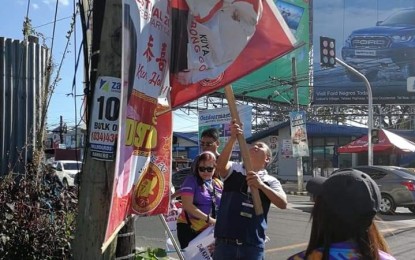By Nanette Guadalquiver/PNA

BACOLOD CITY — The Commission on Elections (Comelec) here is reminding candidates to follow the rules on designated common poster areas as the campaign period for national positions start this week.
A day after the campaign for senators and party-list groups began on Tuesday, City Election Officer Mavil Majarucon-Sia led her staff in checking the compliance and they were able to take down illegally posted campaign materials in some areas around the city.
Marajucon-Sia said on Wednesday, they were able to go around in about 10 villages, and took down several posters and tarpaulins.
“For now, we can only take down the posters of those running for senators and partylist representatives. Although we have observed the violations are not blatant,” she said.
Marajucon-Sia noted that local coordinators of some senatorial candidates have taken down their large campaign tarpaulins before February 12.
During the “Operation Baklas” on Wednesday, they were able to take down only less than 10 campaign materials since the rest were already removed.
In Bacolod, the Comelec has identified at least 92 common poster areas in the 61 barangays for the May 13 elections.
Among these are located in covered courts, gymnasiums, areas near the barangay halls, and vacant lots along the highways.
Campaign materials with size not exceeding two feet by three feet can also be posted in a private property with consent of the lot owner.
Marajucon-Sia said as the campaign period continues, the Comelec-Bacolod personnel will try to conduct inspections at least twice a week to monitor the candidates’ compliance with the rules on common poster areas.
Candidates whose campaign posters are installed on trees may be charged for violating Section 3 of Republic Act 3571, which prohibits the cutting, destroying or injuring of planted or growing trees, flowering plants and shrubs or plants of scenic value along public roads, in plazas, parks other than national parks, school premises or in any other public ground.
Violators may be charged with an election offense, which is punishable with one to six years in jail, disqualification from holding public office and deprivation of the right to vote.
